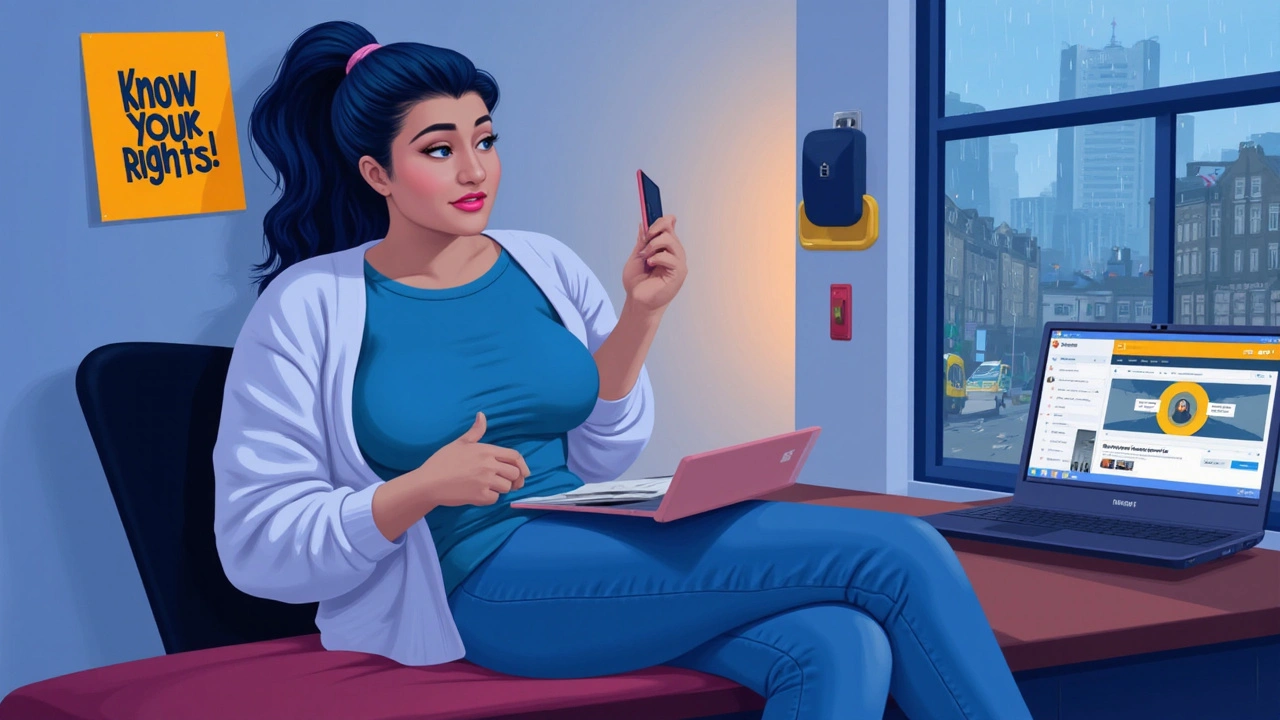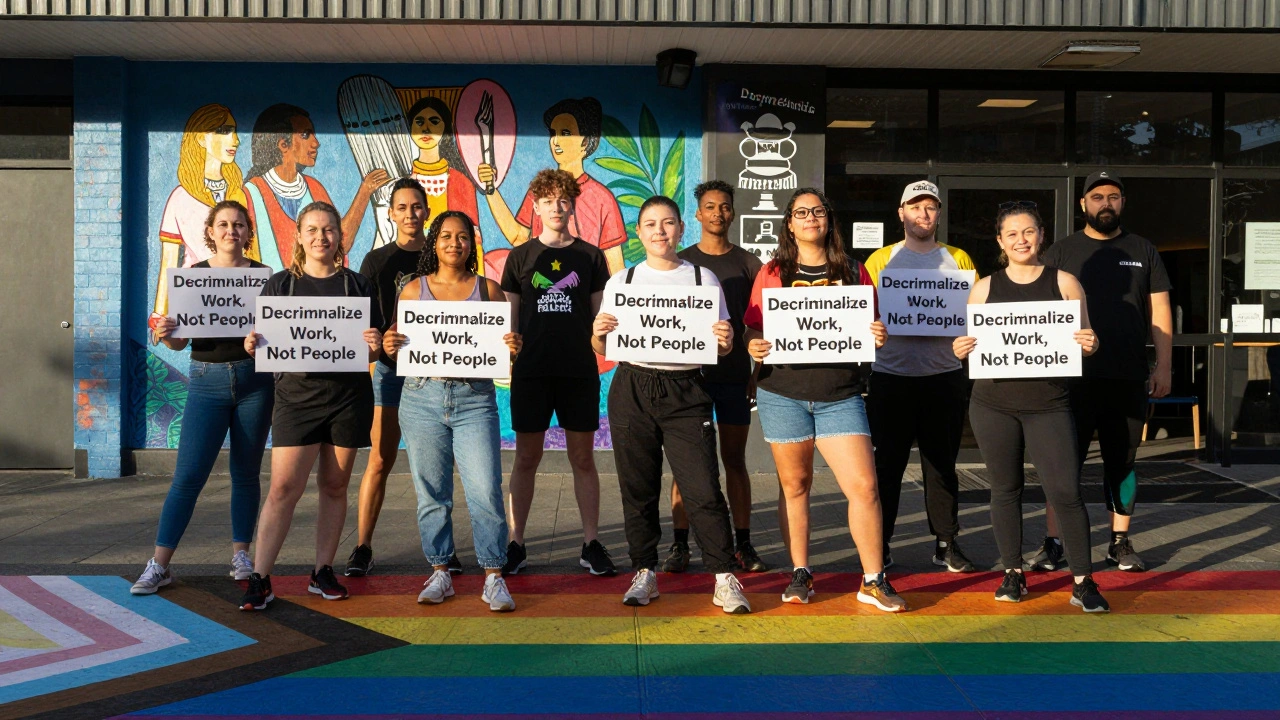You want to make money, stay comfortable, and get home safe after every job. Nothing else should come before your well-being. The stakes are real, but so are the simple things you can do to keep yourself safer—trust me, nobody expects you to be a superhero, just smart and a little prepared.
First off, decide how much info about yourself you share—protect your real name, address, and where you hang out online. Use work-only numbers or fresh social accounts, and keep them separate from your personal life. Apps like Signal or Burner are a game-changer here, giving you privacy for texts and calls.
If you’re meeting a client (especially a new one), always screen them. Ask for references, check online reviews, or use a quick background search. If anything feels off, trust that gut feeling—walk away. Your comfort is non-negotiable, and there’s no shame in putting safety first, even if that means turning down good money.
- Why Safety for Sex Workers Matters
- Key Safety Strategies You Can Use
- Technology Tools: Staying Safe Online and Off
- Managing Boundaries and Red Flags
- Dealing with Emergencies
- Common Myths About Sex Work Safety
Why Safety for Sex Workers Matters
Safety isn’t just wishful thinking for sex workers—it’s basic. The risks are real, and ignoring them can cost you more than just your paycheck. The truth is, the job often comes with unique dangers that most people never have to face at work. Violence, theft, blackmail, and even health risks are all on the table if you don’t take care of yourself. But let’s be clear: working with a plan can make a huge difference.
Here’s a hard fact: in 2023, a study in the U.S. showed that sex worker safety calls to emergency services increased by almost 20%. That’s not because things got worse, but because workers got better at reporting. Still, it’s a reminder that these dangers are far from rare.
| Risk Type | Percentage of Sex Workers Affected (US, 2023) |
|---|---|
| Violence (physical or sexual) | 30% |
| Theft or Robbery | 18% |
| Online Harassment | 42% |
| Health Risks (STDs/Infections) | 28% |
Think about what these numbers really mean. If you work in this industry, just knowing the risks puts you ahead of the game. It makes you more alert and more likely to spot trouble early. Ignoring safety can also have ripple effects: bad news for your friends, your family, or even your work reputation.
There's another angle to this—mental health. When you feel safe, stress levels drop and it’s way easier to set boundaries with clients. And when you don’t have to spend your whole day looking over your shoulder, you can actually focus on your work and your life outside it.
At the end of the day, putting safety first isn’t just common sense—it’s survival. The more you protect yourself, the more power you keep in your own hands.
Key Safety Strategies You Can Use
If you want to keep doing this kind of work for the long haul, solid safety habits are your best friend. Most sex workers swear by a simple list that helps them dodge trouble and keep things professional—and, honestly, comfortable. You don’t need a complicated system; you just need a plan you stick to every day.
- Screen every client before you meet. Ask for ID, social profiles, reviews from other workers, or references. Even a quick chat can tip you off to sketchy behavior or weird demands.
- Always let someone know your location. Apps like WhatsApp or Find My Friends let you share your live spot with a buddy. Some sex workers use code words with friends or partners to give the green light—or signal something’s off.
- Arrange your workspace your way. Whether you host or travel, scope out all exits. Hide anything personal (family pics, real ID, your phone charger if you need it later) and stash a bit of cash for emergencies.
- Keep protection on hand. This covers condoms, lube, and even personal alarms or pepper spray. Don’t just trust clients to bring what you need.
- Get paid upfront, at the door or before anything starts. If someone resists, it’s a red flag. Some folks use payment apps, but know which ones leave a paper trail or might flag transactions.
Here’s a fast fact: A lot of the trouble happens when boundaries get blurred, not always when a client is outright violent. So, setting limits—and sticking to them—matters way more than people think. Stay sober if you can; even one drink can affect your judgment. And if you’re with someone who tries to push you into something you never agreed to, end it right then.
Bottom line? The best sex worker safety tip is building habits that work for you and never feeling weird about prioritizing yourself, no matter what anyone else expects.
Technology Tools: Staying Safe Online and Off
Tech can honestly be a game changer when it comes to sex worker safety. Most folks aren’t just worried about physical safety anymore—privacy leaks, creepy clients finding your real info, and even scammers trying to rip you off are all real threats. Luckily, there’s some solid tech on your side if you use it right.
Start with the basics: use a totally separate phone number for work. Apps like Burner or Google Voice let you get a free or cheap work-only line in minutes. This keeps your personal number private and gives you an easy block button if things get weird.
When texting or calling, stick with encrypted messaging apps like Signal or Telegram. These hide your messages from prying eyes and give you more control. If you ever need to leave a record, Signal can be a lifesaver (it even lets you set messages to disappear on both ends after a set time).
For screening clients, plenty of pros use verification services like VerifyHim, or checking reviews on forums like Switter or Twitter. These platforms offer some protection by letting you read honest feedback from other workers—sometimes one bad review is all you need to know to avoid trouble.
Anytime you meet a new client, consider sharing your location with a friend or service you trust. Apps like SafeCall or the "Check-in" options on WhatsApp or iOS can make sure someone knows where you are for backup. A lot of sex workers swear by these tools because they give them peace of mind every time they’re on a call.
| Tool | What It Does | Price |
|---|---|---|
| Burner / Google Voice | Lets you use a separate number for work | Free on basic, paid premium |
| Signal | Encrypted messaging/calls | Free |
| VerifyHim | Client verification and feedback | Paid |
| SafeCall | Lets someone track your call for emergencies | Monthly fee |
One surprising stat: According to a 2023 survey by the Sex Workers Outreach Project, over 62% of independent workers say they’ve dodged dangerous situations thanks to some kind of digital screening or backup plan. That’s a lot of folks just like you using tech to stay ahead.
"You can’t put a price on feeling safe when you’re at work. I don’t go anywhere without sharing my location with my best friend and using a work-only number—it’s saved me more than once." — Tanya, New York City-based sex worker
The bottom line? Don’t just hope for the best. Take five minutes to set up the right apps and you’ll knock out a lot of risk. Combine digital tools with your own instincts and you’ll be way safer both in-person and online.

Managing Boundaries and Red Flags
Keeping your boundaries clear is not just good practice, it’s your best line of defense. You set the rules—what you do, what you won’t, how, and even where. Making these details clear before meeting a client isn’t just about comfort; it’s about staying in control. If a client tries to haggle, change the deal at the last minute, or get pushy about your rules, that’s not a sign to negotiate—it’s a red flag.
Here are some real tips for managing those lines in the sand:
- Write down your do’s and don’ts. This makes it easier to remember—and to say “no” when pressed.
- Communicate your limits clearly upfront—text, email, or through your booking site. No surprises for anyone.
- If a client pressures you to break a boundary, leave or cut off the conversation. No explanation needed.
- Trust your gut. Feeling weird about someone, even if you can’t explain why, is reason enough to walk away.
Spotting sex worker safety risks is about knowing the warning signs. Look out for clients who:
- Avoid giving you references or basic info
- Want to rush you into decisions
- Offer extra money for ‘just a little more’ than you’re comfortable with
- Refuse to communicate through your preferred, safer channel
- Straight up ignore your boundaries in chats
This isn’t just talk—there’s solid data to back it up. According to a recent survey by SWOP Behind Bars, sex workers who stick to clearly stated boundaries are 70% less likely to report violence or harassment than those who don’t. Here’s a quick look at what boundaries can actually protect you from:
| Boundary Broken | Likelihood of Trouble (%) |
|---|---|
| Agreed Payment Changed | 60 |
| Rules Overstepped (no protection, roughness, etc.) | 52 |
| Ignored Communication Channel | 38 |
| Rushing/Last Minute Change | 45 |
If you find yourself stuck with someone pushing hard or ignoring your limits, remember you have support. There are helplines and community groups—many with people who’ve been there and get it—ready to back you up with specific advice or just a safe ear.
Dealing with Emergencies
When things go wrong, speed and clear thinking matter most. Even when you plan everything, emergencies can pop up—clients might push boundaries, threaten you, or refuse to pay. It helps a lot to have a plan you know by heart before you’re ever in that spot.
One of the best things you can do is have a buddy system. Let someone you trust know where you are, who your client is, and when to expect a check-in. Text them once you’re safe, or have a code word ready that signals trouble. In my circle, nobody thinks twice about sharing details with a close friend. It’s just smart business.
- Keep your phone charged and close by. Don’t rely on a client’s charger—they’re unreliable, and it gives you control.
- Save emergency contacts under a fake name, or as something ordinary so they don’t stand out if someone else is looking at your phone.
- Apps like Noonlight and Circle of 6 can quickly alert your emergency contacts or send your location to someone you trust.
- Know the exits in any space—the bathroom window sometimes counts. Trust me, it helps to notice these things when you walk in, not when you wish you had.
- If you ever feel trapped or threatened, don’t hesitate to create a diversion—spill a drink, fake a phone call, or start coughing. Anything that buys you a second to get out or alert help can make a big difference.
If the situation gets physical, shouting “fire!” has been proven to get a faster public response than yelling for help. People react quicker in these situations—even in hotels or apartments. If you need to call police or an ambulance, remember that you don’t have to give more details than needed. Focus on your sex worker safety and your immediate needs first–there’ll be time to worry about details later.
After an incident, check in with a friend. Consider seeing a doctor if you’re hurt or feel off, even if you’re not sure anything happened. Docs are trained to help, not judge. And don’t be shy about needing a safe rest—sometimes you just need to catch your breath before anything else.
It’s not dramatic or paranoid to prep for emergencies. The people who do it right are just being safe, not scared. Nobody should judge you for making your health and safety a priority, and if you ever need backup, there are online communities out there ready to listen and help.
Common Myths About Sex Work Safety
There are a lot of wild stories and bad advice floating around, so let’s clear up some of the most common myths about sex worker safety. Getting rid of these fake ideas makes it easier to make better choices and actually protect yourself.
Myth 1: Only street-based sex work is risky. The truth is, every corner of the industry has its risks. Working from home, in hotels, or online comes with different challenges—like digital stalking, doxxing, or unsafe client meetups. The tools may change, but the need for smart safety habits stays the same.
Myth 2: If you follow all the rules, you’ll always be safe. You can do everything "by the book" and still face trouble. Setting clear boundaries, screening clients, and using technology helps a lot, but nothing’s 100% foolproof. It’s about stacking the odds in your favor, not looking for a magic fix.
Myth 3: Bad stuff only happens to newbies. Experience helps, but seasoned workers can still get caught off guard. New scams and threats pop up all the time. Staying sharp is a lifelong thing in this work, not just something you do in your first few months.
Myth 4: Police are always there to protect you. In reality, trust with law enforcement can be complicated or completely broken. A 2023 survey found that nearly 60% of independent sex workers in big U.S. cities avoided reporting crimes due to fear of arrest, discrimination, or not being believed. This is why a lot of folks rely on support networks, peer-driven alert systems, or community legal services instead.
Here’s a handy breakdown of some eye-opening stats around safety and support:
| Myth | Reality | Interesting Stat |
|---|---|---|
| Online work is totally safe | Digital risks like stalking and doxxing are real | Almost 40% of online workers reported harassment in 2024 (U.S. survey) |
| Most dangers come from strangers | Repeat clients or acquaintances can be risky too | 23% of reported incidents involved a repeat client |
| Community support isn’t necessary | Peer networks spot red flags fast | 75% of workers who use peer alert systems take action on warnings |
Don’t trust easy answers or online "hacks" from internet strangers. Focus on advice from people who’ve actually done this work, and stay plugged into real support networks. The safer you stay, the more confidently you can do your job.





